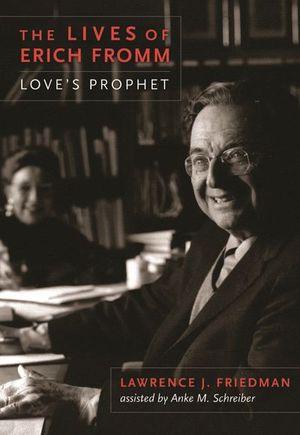The Lives of Erich Fromm
Published by Columbia University Press
This “brilliantly comprehensive study” explores the influential thinker’s contributions to psychology, philosophy and more—“academic biography at its best” (Kirkus, starred review).
Erich Fromm was a political activist, psychologist, psychoanalyst, philosopher, and one of the most important intellectuals of the twentieth century. Known for his theories of personality and political insight, Fromm dissected the sadomasochistic appeal of populist dictators. He eloquently championing the virtues of love rooted in joyful contact with others and humanity at large. Admired all over the world, Fromm continues to inspire with his message of universal brotherhood.
In the first systematic study of Fromm's influences and achievements, Lawrence J. Friedman revisits the thinker's most important works, including Escape from Freedom and The Art of Loving. He also recounts Fromm's political activism as a founder of Amnesty International, the National Committee for a Sane Nuclear Policy, and other peace groups. Friedman also reveals Fromm's support for anti-Stalinist democratic movements in Central and Eastern Europe and his efforts to revitalize American democracy.
Friedman elucidates Fromm's key intellectual contributions, especially his innovative concept of "social character," in which social institutions and practices shape the inner psyche, and he clarifies Fromm's conception of love as an acquired skill. Taking full stock of the thinker's historical and global accomplishments, Friedman portrays a man of immense authenticity and spirituality who made life in the twentieth century more humane than it might have been.
Erich Fromm was a political activist, psychologist, psychoanalyst, philosopher, and one of the most important intellectuals of the twentieth century. Known for his theories of personality and political insight, Fromm dissected the sadomasochistic appeal of populist dictators. He eloquently championing the virtues of love rooted in joyful contact with others and humanity at large. Admired all over the world, Fromm continues to inspire with his message of universal brotherhood.
In the first systematic study of Fromm's influences and achievements, Lawrence J. Friedman revisits the thinker's most important works, including Escape from Freedom and The Art of Loving. He also recounts Fromm's political activism as a founder of Amnesty International, the National Committee for a Sane Nuclear Policy, and other peace groups. Friedman also reveals Fromm's support for anti-Stalinist democratic movements in Central and Eastern Europe and his efforts to revitalize American democracy.
Friedman elucidates Fromm's key intellectual contributions, especially his innovative concept of "social character," in which social institutions and practices shape the inner psyche, and he clarifies Fromm's conception of love as an acquired skill. Taking full stock of the thinker's historical and global accomplishments, Friedman portrays a man of immense authenticity and spirituality who made life in the twentieth century more humane than it might have been.
BUY NOW FROM
COMMUNITY REVIEWS

